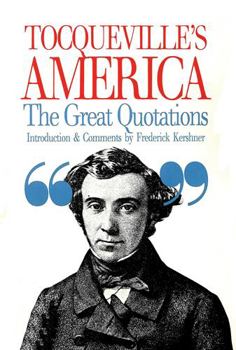Tocqueville's America: The Great Quotations
Select Format
Select Condition 
Book Overview
"...boldness of enterprise is the foremost cause of (America's) progress, its strength, and its greatness." With that succinct statement a young French aristocrat, Alexis de Tocqueville, expressed his perceptive analysis of the United States, following a nine-month tour of the young republic beginning in May of 1831. His remarkable two-volume study, Democracy in America , presented an insight that has withstood the test of time to the extent of being described by many scholars as the finest treatise of its kind in the past century and a half. As one of a few companies spanning that period of time, Cooper Industries represents an intriguing mirror for Tocqueville's long-range observations. Boldness of enterprise has indeed been reflected by the efforts of individual entrepreneurs whose companies have come together as Cooper Industries, and many of their names continue to identify successful company products. Among those men were Charles and Elias Cooper, Robert W. Gardner, Huntington B. Crouse, Jesse L. Hinds, Carl E. Weller, Charles W. Kirsch, E.T. Lufkin, William T. Nicholson, and Jacob Wiss. "They (men living in democracies) are therefore all led to engage in commerce, not only for the sake of the profit it holds out to them, but for the love of the constant excitement occasioned by that pursuit," wrote Tocqueville. Were profit the only motive, most of the men who have guided Cooper Industries through the fluctuating business cycles of 150 years would have given up in the depths of economic disasters created by depressions and market shifts. Cooper's growth by no means has been a steady uphill climb; but no reviewer could criticize its history as lacking excitement. Tocqueville contrasted the American "notion of labor" with that of Europeans, writing that, in the United States, "not only is labor not dishonorable among such a people, but it is held in honor; the prejudice is not against it, but in its favor." The history of Cooper Industries is sprinkled liberally with instances of employees rising from beginning "shop floor" jobs to high management positions. Respect for all positions and opportunities for advancement have remained key elements of company philosophy since Cooper was founded in 1833 in Mount Vernon, Ohio, on the edge of a huge, undeveloped frontier.
Format:Paperback
Language:English
ISBN:0821407538
ISBN13:9780821407530
Release Date:August 1984
Publisher:Ohio University Press
Length:119 Pages
Weight:0.40 lbs.
Customer Reviews
1 rating
Raises Questions To Ponder
Published by Thriftbooks.com User , 19 years ago
"Tocqueville's America: The Great Quotations" is a stimulating collecting of quotations from this renowned observer of, and commentator on the early American scene. Arranged topically, the reader is treated to a broad range of thought provoking ideas of what America was, served in the span of this relatively short book. Tocqueville shares his ideas on how Democracies and Aristocracies behave differently in the social, economic, political, religious and military spheres. Among the selections, I found the most thought provoking to be those which challenge the reader to think about whether the America of Tocqueville's day still exists, or have we become more like the Europe with which he contrasted us. Is the taste for intellectual pleasures still lacking in America, as compared to other countries? Do we still produce a large volume of low quality art, as compared to the small volume, high quality produced by others? Do we still have a broad, but shallow education? Is our country still decentralized? This book raises questions which we can ponder indefinitely. This is a book to read, reread and just peruse for the intellectual stimulation which only this sage of yore can provide.






